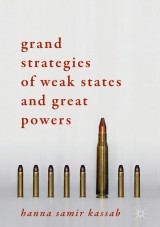Details

Grand Strategies of Weak States and Great Powers
|
117,69 € |
|
| Verlag: | Palgrave Macmillan |
| Format: | |
| Veröffentl.: | 26.12.2017 |
| ISBN/EAN: | 9783319704043 |
| Sprache: | englisch |
Dieses eBook enthält ein Wasserzeichen.
Beschreibungen
<p>Grand strategies can be thought of as overall survival strategies of all states. Great powers seek survival against other great powers seeking to undermine their power and position, determining prestige-seeking behavior as psychotic and destructive. Weak states suffer from systemic vulnerabilities and trade whatever political power they have to a great power for economic assistance. If enough weak states support a particular great power, then that great power will become more powerful relative to competitors. This forms an international system fashioned by these transactions. </p>
1. Introduction<div><br/></div><div>Part 1: Theory</div><div><br/></div><div>2. Grand Strategies of States in Anarchy: Prestige and Self-Determination</div><div><br/></div><div>3. Balance of World Systems and Neo-Empire</div><div><br/></div><div>4. Systems-Creation and Competition<br/></div><div><br/></div><div>Part 2: Case Studies</div><div><br/></div><div>5. The Global South and the Neo-Empires of the United States and China</div><br/><div>6. Neo-Empires Under Construction: The European Union and Eurasian Union</div><div><br/></div><div>Part 3: Cognitive Theory</div><div><br/></div><div>7. States as Psychopaths, Theorists as Psychoanalysts: The Reason for War</div><div><br/></div><div>8. Two Choices: War or Peace<br/></div><div><br/></div><div>9. Conclusion</div>
<b>Hanna Samir Kassab</b> is Assistant Professor at Northern Michigan University, USA.
<p>Grand strategies can be thought of as overall survival strategies of states of all states. Great powers seek survival against other great powers seeking to undermine their power, position determining prestige-seeking behavior as psychotic and destructive. Weak states suffer from systemic vulnerabilities and trade whatever political power they have to a great power for economic assistance. If enough weak states support a particular great power, then that great power will become more powerful relative to competitors. This forms an international system fashioned by these transactions. </p><p><b>Hanna Samir Kassab</b> is Assistant Professor at Northern Michigan University, USA.<br/></p>
<p>Combines structural realism and neo-Marxism in new, compelling ways</p><p>Provides excellent insights into the political and military dynamics of the world system</p><p>Provocatively links world systems analysis with the literature on psychopathy and forgiveness</p>
Combines structural realism and neo-Marxism in new, compelling ways<div><br/></div><div>Provides excellent insights into the political and military dynamics of the world system<br/></div><div><br/></div><div>Provocatively links world systems analysis with the literature on psychopathy and forgiveness<br/></div><div><br/></div><div><br/></div>
“Hanna Kassab continues his innovative task of integrating the role of small and weak states into the theoretical frameworks that dominate the field of international relations. By successfully marrying structural realism to the dependency elements of world systems theory, he creates a model of the international system more akin to the reality of the existing system than that of the dominant paradigms. . This imaginative study. including the intriguing argument about the theorist as psychoanalyst, is essential reading for anyone concerned with theory building in international relations!” (Roger E. Kanet, Professor of Political Science, University of Miami) <p>“Hanna Kassab puts new emphasis on the interactions of great powers with weaker states. Great powers seek prestige and need weaker states to receive it. Confronting rigorous theory with convincing case study evidence, Kassab explores how weaker states trade their support for aid and other perks, but remain locked into neoempires that keep them in dependency. In an age when the risk of conflict between major blocks of power looks ever more possible his insightful analysis could not have been more timely.” (Dreher, Professor of International and Development Politics, Heidelberg University, Germany)</p> <p>“At a time when international relations are being upended by many unprecedented changes, Hanna Samir Kassab offers a conceptual framework that is sure to spark an indispensable debate.” (Moisés Naím, Distinguished Fellow, Carnegie Endowment for International Peace and author of The End of Power)</p>
Diese Produkte könnten Sie auch interessieren:

Inclusión educativa de niños, niñas y adolescentes migrantes venezolanos, en Colombia

von: Douglas Jiménez

15,99 €
















